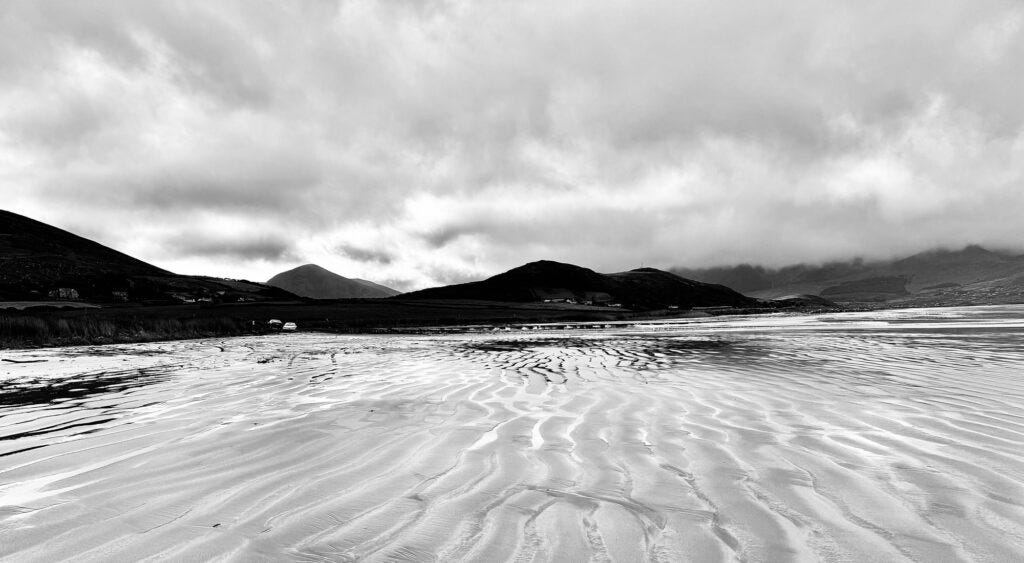Lux Hibernensis
To a photographer, there’s something very special about the light in Ireland (much as there is something special about Provençale light if you’re a painter). In Ireland it comes from having sunlight continually filtered by clouds that are constantly on the move. Walking on Kilcummin beach on the Dingle peninsula at the weekend I was suddenly struck by this scene, which made the point nicely.
Quote of the Day
“The only thing ‘going with the flow’ are dead fish.”
Bill Jay
Musical alternative to the morning’s radio news
Verdi | La Dona e mobile | Pavarotti
Opera is a preposterous art form, but it doesn’t half bring out the best in its performers. The great mystery (for me, anyway) is why singers like Pavarotti never seem to run out of breath. Also, in this recording, I kept wondering how he would combine drinking with singing.
Long Read of the Day
Thomas Mann and the European disease of nihilism
An intriguing essay by Tanjil Rashid in the New Statesman on The Magic Moountainand the issues at the heart of the novel.
One summer’s day in 1952, Thomas Mann lined up at Cambridge University’s Senate House to receive an honorary doctorate. The ceremony passed without incident. Afterwards, an Indian man was seen sidling up to him on King’s Parade. It turned out to be Jawaharlal Nehru: the Prime Minister of India. He had also just been honoured by the university. “I would like to pay my own tribute,” Nehru announced to Mann. But to what? It was, according to witnesses, The Magic Mountain that Nehru wished so keenly to discuss with its author. “A great novel indeed,” Nehru reportedly said.
In this, The Magic Mountain’s centenary – Mann’s masterpiece was published in Germany 100 years ago this month – I have been wondering about the significance of that conversation. Mann was then Europe’s most venerated living novelist, already a Nobel Laureate but more crucially, the most influential German writer to have survived the Second World War with his conscience intact. Nehru, for his part, was the pre-eminent statesman of the formerly colonised peoples of Asia. What was it about a novel set in a Swiss sanatorium that meant it would end up at the centre of this tantalising East-West dialogue?
Davos – the alpine resort where Mann first conceived, and set, The Magic Mountain – is not today an obvious inspiration for such an exchange…
I’ve always shirked reading the book — too long, too serous, too portentous, I thought. But my resolve weakened after reading Colm Toibín’s (equally massive) book on Mann, in which he did to him what he had earlier done to Henry James. After this essay I may have to cave in.
Books, etc.
I’m nearly through Adam Kirsch’s short book and finding it riveting, which is weird given its grim subject-matter — two currently ascendant philosophical trends: one is Anthropocene antihumanism (the belief that our climate destruction has doomed humanity and that we should welcome our extinction because our species was patently not good for the planet); the other is Transhumanism (the belief that genetic engineering and artificial intelligence will lead to new forms of life superior to humans). Kirsch covers this forbidding field with admirable intelligence and panache to produce the kind of book one wants to give to people for Christmas. The only problem is that they might not thank you for it!
Linkblog
Something I noticed, while drinking from the Internet firehose.
Solar panels can increase grape yield by up to 60%
Now here’s a genuine win-win outcome.
French agrivoltaics company Sun’Agri says that two of its facilities increased grape yields by 20% to 60% in 2024, compared to areas without solar panels. The PV modules helped regulate temperature fluctuations, reducing summer heat peaks and winter temperature declines.





